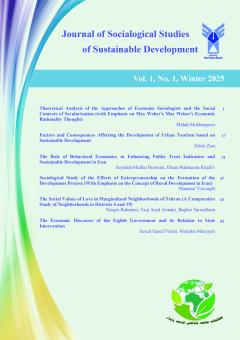"The Role of Behavioral Economics in Enhancing Public Trust Indicators and Sustainable Development in Iran"
Subject Areas : Sociology of Development
Ehsan Rahmani khalili
1
*
![]() ,
Seyedeh Maliheh Hosseini
2
,
Seyedeh Maliheh Hosseini
2
1 -
2 - Department of Sociology. Faculty of Social Sciences Communication and Media Islamic Azad University Central Tehran Branch
Keywords: Behavioral Economics, Public Trust, Sustainable Development, Behavioral Nudges, Economic Governance,
Abstract :
While classical economic theories are based on the assumption of rational and calculating individuals, real-world human behavior shows that people often make decisions under the influence of emotions, incomplete information, and limited self-control. Behavioral economics, as an interdisciplinary field combining insights from psychology, sociology, and cognitive sciences, seeks to analyze economic decision-making within a realistic and human-centered context. One of the most significant applications of this approach is its role in shaping and rebuilding public trust—a fundamental element for achieving sustainable economic and social development. In the context of contemporary Iran, where public trust has been eroded by various social and institutional challenges, understanding this connection becomes especially crucial. This study employs theoretical analysis and document-based research to explore how behavioral economics can help strengthen public trust and facilitate progress toward sustainable national development. The findings suggest that implementing behavioral policies—such as designing targeted nudges, improving choice architecture, and reducing cognitive biases—can guide citizens toward more beneficial decisions while enhancing their confidence in policymaking institutions. The paper concludes by proposing several practical recommendations for leveraging the potential of behavioral economics to improve economic governance, address social inequalities, and build social capital as foundational pillars for sustainable development.
انصاری سامانی، حبیب؛ پورفرج، علیرضا؛ زارع، مسعود؛ امینی، عباس (۱۳۹۴). مقدمه اي بر اقتصاد رفتاري:مفهوم، روش شناسي و شيوه هاي استخراج ترجيحات، اقتصاد تطبیقی، پژوهشگاه علوم انسانی و مطالعات فرهنگی، سال دوم،شماره اول
بیگدلو، مهدی و باقری، عبدالرضا (۱۳۹۴). فصلنامه پژوهشنامه نظم و امنیت انتظامی، سال هشتم، شماره۱.
دادگر، یدالله(۱۳۹۶). الگوهاي اقتصاد رفتاري و ظرفيت اصلاح رويكردحاكم، اقتصاد تطبیقی، پژوهشگاه علوم انسانی و مطالعات فرهنگی، سال چهارم، شماره اول.
درویش، محمدرسول؛ قائدی، محمدرضا؛کشیشیان شیرکی، گارینه؛ توحیدفام، محمد(۱۳۹۸). مؤلفههای تأثیرگذار بر سرمايه اجتماعی و اعتماد عمومی در جمهوری اسلامی ايران:مطالعه موردی دولت حسن روحانی،فصلنامه جامعه شناسی سیاسی ایران، سال دوم، شماره چهارم.
فتحی، مریم،1403،بررسی نقش اعتماد عمومی در شهروندان بر توسعه پایداری و بازآفرینی شهری،https://civilica.com/doc/2060009
کاظمیپور، عبدالمحمد و گودرزی، محسن (۱۴۰۱). فراز و فرود اعتماد در ایران طی نیم قرن اخیر: نگاهی به روندها، علل و پیامدها، دو فصلنامه مسائل اجتماعی ایران، سال سیزدهم، شماره ۱.
لیال ترکی، علی، فتحی، سعید، و صمدی، سعید. (۱۴۰۰). بررسی تشکیل حباب قیمت سکه با استفاده از تورش اعداد رند: رویکرد اقتصاد رفتاری مجله، مطالعات اقتصادی و اجتماعی ایران.
Abd Elkhalek, A. M. A. (2020). An Assessment of the Applicability of Behavioral Economics Tools to Policy Making Process
Considering Sustainable Development Goals. International Journal of Economics and Finance, 12(10), 57. Challoumis, C. (2024). "Behavioral Economics Concepts and the Q.E. Method". International Journal of Multicultural and
Multireligious Understanding, October 2024.
Coleman, J. S. (1990). Foundations of Social Theory. Harvard University Press.
Fukuyama, F. (1995). Trust: The Social Virtues and the Creation of Prosperity. Free Press.
Hardin, R. (2006). Trust. Polity Press.
Kahneman, D. (2011). Thinking, Fast and Slow. Farrar, Straus and Giroux.
OECD. (2022). Trust and Public Policy: How Better Governance Can Help Rebuild Public Trust.
Ostrom, E. (1990). Governing the Commons: The Evolution of Institutions for Collective Action. Cambridge University Press.
Putnam, R. D. (1993). Making Democracy Work: Civic Traditions in Modern Italy. Princeton University Press.
Putnam, R. D. (2000). Bowling Alone: The Collapse and Revival of American Community. Simon and Schuster. Raja, P. (2014). Social Capital and Sustainable Development in the Framework of New Institutional Economics. Pertanika
Journal of Social Science and Humanities, 22(S), 97-110
Sachs, J. D. (2015). The Age of Sustainable Development. Columbia University Press.
Stiglitz, J. E. (2002). Globalization and Its Discontents. W.W. Norton & Company.
Thaler, R. H., & Sunstein, C. R. (2008). Nudge: Improving decisions about health, wealth, and happiness. Yale University Press. Thaler, R. H., & Sunstein, C. R. (2008). Nudge: Improving Decisions About Health, Wealth, and Happiness. Yale University
Press.
United Nations. (2015). Transforming our world: the 2030 Agenda for Sustainable Development.
World Bank. (2023). World Development Indicators.

